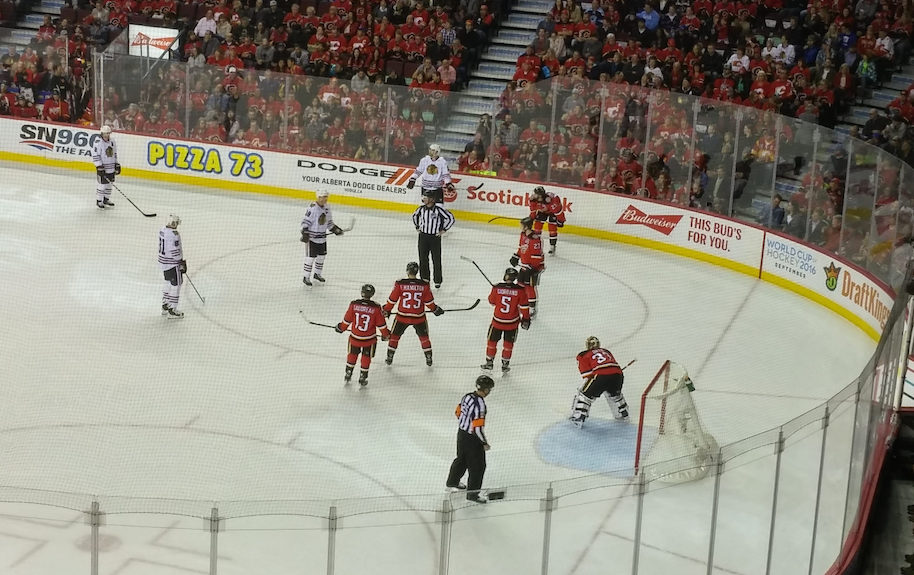Like this column? rabble is reader-supported journalism. Chip in to keep stories like these coming.
Given hockey’s quasi-official status as Canada’s national sport, the poor performance of Canada’s NHL teams is generating a lot of discussion. U.S. President Obama kidded Prime Minister Trudeau about this during the latter’s recent visit to Washington.
It seems that no Canadian team will reach the playoffs this year. When this last happened in 1970, the NHL was a very different beast. Only 12 teams were in the league (compared to 30 today), and only Montreal and Toronto were based in Canada.
Montreal and Toronto, along with four U.S teams, played in the East Division in 1970. Only the top four of six teams in each division made the playoffs. It was mathematically possible for the two Canadian East Division clubs to be at the bottom of the standings.
But how likely was this?
Let’s label the six teams A, B, C, D, E and F, with E and F the two Canadian teams. There are 15 possible combinations of the four playoff teams: ABCD, ABCE, ABCF, ABDE, ABDF, ABEF, ACDE, ACDF, ACEF, ADEF, BCDE, BCDF, BCEF, BDEF and CDEF. Only the first combination excludes both Canadian teams, giving one chance in 15 — a probability of 0.0667 (roughly 7 per cent).
A better way to analyze this is with conditional probabilities. In 1970 there was a 4/6 chance that a U.S. team would win the division. With that team in the playoffs, the chance of a U.S. team in second place was 3/5. Keep going: third place 2/4, fourth place 1/3. Multiply these together and you get 1/15 again.
What if the two Canadian teams had been in separate divisions? For each division, the probability of a U.S.-only playoff would have been 5/6 x 4/5 x 3/4 x 2/3, or 1/3. In this theoretical scenario, the likelihood of a U.S.-only playoff for both divisions combined would be 1/3 x 1/3, or 1/9 (roughly 11 per cent).
What about today?
Ten of 14 Western Conference teams, and 13 of 16 Eastern Conference teams are U.S.-based. Eight teams in each conference make the playoffs. The probability that all will be U.S.-based is 10/14 x 9/13 x 8/12 x 7/11 x 6/10 x 5/9 x 4/8 x 3/7 = 0.01495 in the West, and 13/16 x 12/15 x 11/14 x 10/13 x 9/12 x 8/11 x 7/10 x 6/9 = 0.1 (exactly) in the East. All things being equal, the probability that no Canadian team makes the playoffs is 0.1 x 0.01495 = 0.001495: around 0.15 per cent.
Taking into account the divisional structure and existence of wildcard teams in each conference, the probability is actually closer to 0.13 per cent.
When probabilities get this low, statisticians get interested. What could possibly account for no Canadian team making the 2016 playoffs (assuming this occurs)? Are the probabilities not independent, such that when one Canadian team plays poorly, others do also? Might there be some overarching factor that makes Canadian teams inferior, on average?
The last Canadian team to win a Stanley Cup was Montreal in 1993. If no Canadian team makes the playoffs this year it means no Stanley Cup for the 23rd year in a row. What is the chance of that?
All things being equal, the ratio of U.S.-based teams to the total number of NHL teams is the likelihood that a U.S. team will win in any given year. This probability was 0.67 when Montreal won in 1993 (16 of 24 teams were U.S.-based). With NHL expansion in the U.S. throughout the ’90s, and the loss of teams in Quebec City and Winnipeg, the probability of a U.S. win had risen to 0.80 by 2000. The return of the Jets in 2011 knocked this back to 0.77.
The likelihood of repeated U.S. wins over any time period is the product of the probabilities for each individual year. This works out to be 0.28 per cent for the 23-year period from 1994 through 2016.
Again, statisticians would take note. Such a streak is highly improbable.
Perhaps rabble readers — having broad-minded social concerns — are less likely to care about NHL playoffs and Stanley Cups than average Canadians, and are disinclined to debate the possible causes of the poor performance of Canadian NHL teams.
If so, please accept my apologies. Consider this a mini-refresher course in basic concepts of probability.
Ole Hendrickson is a retired forest ecologist and a founding member of the Ottawa River Institute, a non-profit charitable organization based in the Ottawa Valley.
Photo: Daniel/flickr
Like this column? rabble is reader-supported journalism. Chip in to keep stories like these coming.



